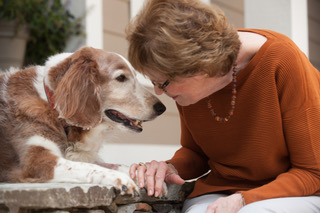Press
Laurel Hunt’s lifelong love of animals has led to her mission to promote understanding of the enduring bonds that we form with pets. She explores the human-animal bond through writing on pet loss, pet hospice, pet therapy, and the many ways through which pets improve our lives and our health. She is active in organizations that promote the human/animal bond including pet therapy, shelter and rescue groups, and pet hospice.
Following the loss of two of her dogs to cancer, Laurel compiled Angel Pawprints; Reflections on Loving and Losing a Canine Companion, a collection of tributes to man’s best friend. Subsequently, she compiled Angel Whiskers: Reflections on Loving and Losing a Feline Companion. Laurel knows first-hand the sorrow of losing a beloved pet, and what makes that type of loss so poignant.
Q & A With Laurel Hunt
Sometimes people are more devastated by the loss of their pet than by the loss of a human family member. What is that about?
I think it’s a testament to the deep bonds that you form with a pet over time The pet is always there for you with its unconditional love, in good times and in bad. Also, consider the changing demographics of our society. For many people whose children have left the nest, or who never had children, the pet becomes the child. So many people live alone – older people, single people – and the pet is their constant companion and primary source of emotional support. You form daily routines around caring for the dog, walking it and so on. The pet may also facilitate social contact as you meet other pet owners in the park, for instance. But the most powerful factor in the bond is the unconditional love and acceptance that we receive from pets. They accept us exactly as we are and are always there for us. One of my favorite stories in Angel Pawprints is about a springer spaniel named Barney, who went everywhere with his master for 12 years. Reflecting on Barney’s life, the owner says, “Barney’s love enabled me to do things I only thought I was doing alone.” That depicts the power of a dog’s constant companionship and the bond.
Is the human/animal bond becoming more recognized? How do you see that changing?
Another trend I’ve noticed is pets are often named in a person’s obituary, in the mention of surviving loved ones. And sometimes the deceased is pictured with their pet. Now there is greater recognition and acceptance of pets as beloved family members.
Recognition of the human/animal bond is increasing, and when the bond is broken through loss of the pet, our society is becoming more sensitive to pet loss and bereavement. But we still have a long way to go.
How is the loss of a pet different from other loss experiences?
Many people are unprepared for the emotional aftermath of losing their pet. Because the pet is totally dependent on you, it is easy to be lulled into thinking that it will live forever, that you have the power to keep it from harm. Due to better nutrition and veterinary care, pets are living longer, but as they age, they become vulnerable to diseases such as cancer. My experience in caring for dogs with cancer was that I progressed from shock and denial at the diagnosis, to the point that I became closely attuned to their day-to-day feelings. I understand the stress that caregivers experience. It is emotionally draining and exhausting. But I would do it all over again in a heartbeat.
Is there a certain way to go about grieving for a pet? And if people don’t grieve appropriately, what harm can that cause?
It’s important to accept that you will go through a period of very intense feelings, and you will not be able to carry on your normal activities at your usual pace. You may feel overwhelmed, unable to concentrate, and experience sleep disturbances. You need to be kind to yourself and recognize that this will pass. Perhaps take a vacation that you may have postponed during the pet’s illness. You will experience the stages of grief that accompany the loss of any significant relationship – anger, denial, guilt, depression, and finally, acceptance. No one can predict how long this will last; it is very individual. These feelings are completely normal; there is nothing weird or crazy about feeling them or expressing them. Sharing your feelings with others who understand can be very helpful. Many communities have pet loss support groups, and there are online groups as well.
There are also rituals that can help to honor your pet’s memory. These include memorial donations to a humane society, planting a beautiful bush or tree in the pet’s memory, creating a book of favorite photos, or simply writing a letter to the pet to say how much it meant to you. One of the stories in Angel Pawprints mentions placing a family photo in the pet’s grave, to signify all the people who loved him. I found that suggestion very comforting. There are also numerous pet loss web sites where you can post a tribute. The point is it’s okay to do whatever comforts you.
What about when a pet is euthanized? How does that affect grief?
I recommend that to the extent that you can plan for this situation, you should do so. Ask your veterinarian what to expect with the trajectory of the pet’s illness. What are the signs of pain or decline? It’s helpful to keep a log, noting any changes in your pet. Discuss the euthanasia procedure and decide whether you want to be present. Does your community have a mobile hospice vet who will come to your home? This service is growing in popularity because it can provide a peaceful end in the pet’s familiar environment. Think about the disposition of remains. Ask about cremation and pet cemeteries. Although some pets will pass away on their own, many must be helped along when quality of life is diminished. If you plan for this, you won’t have to make hasty decisions that you may later wish you had done differently.
Regardless of how your pet leaves you, remember always that your time together is a precious gift. A pet’s love is forever, and they live on in our hearts and memories.

Presentations
Laurel has presented on “Funding and Sustaining a Hospital Pet Therapy Program” at national conferences including the International Society for Anthrozoology/Human-Animal Interaction Conference, the American Holistic Nursing Association Annual Conference, and the Association for Healthcare Philanthropy.





